Langues - Communication - Ressources - Projets - Web 2.0
Le podcasting ou baladodiffusion est un moyen de diffusion de fichiers audio sur le web, auxquels peuvent s´abonner les internautes, via un flux de syndication (RSS). Les termes audioblog, radioblog ou podcast représentent différentes variantes intégrant des fichiers son, du streaming ou un fil RSS dans un weblog. Source: Dossier Weblogs - Médias - Podcasting
L'utilisation de podcasts favorise l’acquisition de compétences fondamentales en langues étrangères, telles que la prononciation et la compréhension orale. Plusieurs études soulignent l'importance de la baladodiffusion pour l’apprentissage d' une langue étrangère: On peut ainsi améliorer la prononciation des élèves avec des activités et exercices de production orale, ainsi qu' intégrer la correction de la prononciation, l'évaluation des enregistrements audio ou l'application de tâches collaboratives ou de projets de télécollaboration entre apprenants (Abdous,2009; Ducate & Lomicka, 2009; Lord, 2008; Tomé, 2011).
Podcasting can provide access to a large amount of authentic input, as well as to teaching materials of varying quality that have different approaches to language learning behind them (depending on the content provider): from behaviourist to cognitive constructivist and communicative approaches, situated learning, and lifelong learning. The impact of podcasting on learning in general and language learning in particular could be similar to the impact of the arrival of the Internet in terms of giving access to language learning materials (Rosell-Aguilar, 2007)
COMMENT CRÉER OU ÉCOUTER UN PODCAST ?
PODCASTING ET APPRENTISSAGE DES LANGUES
ANNUAIRES – SITES – PODCASTS – ÉDUCATION
APPLICATIONS et UTILISATION du PODCASTING

OUTILS PODCASTING / BALADODIFFUSION
Podcasts et baladodiffusion en Education – Langues
HISTORIQUE: PREMIERS PODCASTS POUR L'APPRENTISSAGE DES LANGUES
http://flecampus.ning.com/profiles/blogs/podcasts-langues-historique
A number of researchers have
claimed that podcasts can be an effective language-learning tool. Since
most students are now coming to class fully equipped with digital
devices, podcasting can create a ubiquitous learning opportunity. As
long as these students have any sort of MP3 player, they can access
classroom
homework or extra teacher-recommended materials
while “riding the bus or subway, walking across campus or through a
shopping mall”.
D'AUTRES PISTES, RÉFÉRENCES ET RESSOURCES
dans les COMMENTAIRES de ce message...
Vues : 5069
Balises : Apprentissage, Baladodiffusion, Langues, Media, Podcasting, Social
Commenter
-
 Commentaire de Gabrielle le 14 décembre 2010 à 14:47
Commentaire de Gabrielle le 14 décembre 2010 à 14:47 -
PS : je viens de retrouver un article portant sur le thème du podcast, lu il y a quelques temps dans la revue Alsic, basé sur l'anglais et la grammaire, il peut y avoir des choses intéressantes...
-
 Commentaire de Gabrielle le 14 décembre 2010 à 14:41
Commentaire de Gabrielle le 14 décembre 2010 à 14:41 -
Bonjour à tous !
Je suis nouvelle sur ce réseau mais lis depuis longtemps déjà vos échanges. Alors quelques petits mots pour commencer à participer un peu... Toutes les discussions ici sont d'une richesse étonnante, merci, vraiment !
Et je viens de trouver la référence à mon blog Gabfle faite par Zhying en bas de page, c'est rigolo...
À très bientôt.
-
 Commentaire de Monica le 13 décembre 2010 à 21:04
Commentaire de Monica le 13 décembre 2010 à 21:04 -
Bonjour,
L'article de Lord (2008) nous oriente vers les limitations et les possibilités les plus importantes du podcasting:
Lord, G. (2008) Podcasting communities and second language pronunciation. Foreign Language Annals, 41(2), 364-379.
Surprisingly, however, there is little information in the literature about how technological tools can be used to teach pronunciation,
Nonetheless, among the myriad technological tools available to instructors today, podcasting would seem to lend itself quite nicely to the development of oral skills.
-
 Commentaire de Zhying le 11 décembre 2010 à 20:42
Commentaire de Zhying le 11 décembre 2010 à 20:42 -
Bonjour à tous,
Le Podcasting a connu un grand succès dans les milieux éducatifs. Il y a quelques années les enseignants ont commencé a créer des podcasts pour la classe;
mais la voix des étudiants était souvent négligée.
Dans l'enseignement des langues il faut dépasser les activités de compréhension orale, et investir dans la production orale.
Quand les apprenants prennent la parole ...
comme par exemple:
Juan Uniovi - La voix des ÉTUDIANTS
http://juanuniovi.podomatic.com/
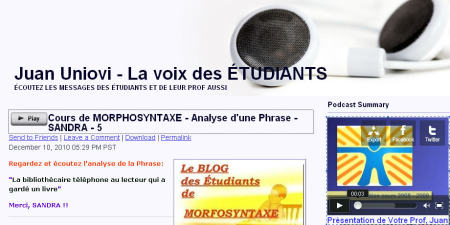
-
 Commentaire de Sylvie le 9 décembre 2010 à 13:32
Commentaire de Sylvie le 9 décembre 2010 à 13:32 -
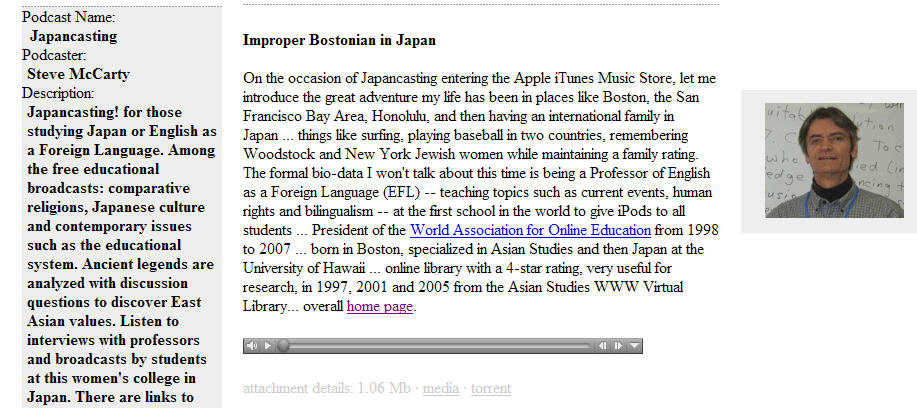
McCarty, S. (2005). Spoken Internet To Go: Popularization through Podcasting. JALT CALL, 1(2), 67-74. http://www.waoe.org/president/podcasting_article.html
Extraits:
First College in the World to use iPods in Education
With all the media scrutiny of Duke University’s "iPod First Year Experience" (Bugeja, 2005), what has escaped media attention is that a women's college outside of the U.S. was the first in the world to provide iPods to incoming first year students. One college newspaper did report that the "first-ever iPod giveaway was at Osaka Jogakuin College in Japan, where officials distributed 15-gigabyte iPods to their 210 incoming freshmen last April. The school put its original English audio-learning aids into their students' iPods to help students learn English more efficiently" (Mochizuki, 2004).
That was on April 3, 2004, nearly a half year before Duke. Now in the second year, iPods are integrated into the curriculum and all the students in the junior college division are studying with them. All the students major in English as a Foreign Language (EFL), and one required course in the four-year as well as two-year college is current events, where students need to acquire the latest news stories by synching their iPods with campus computers in order to do homework assignments.
Japancasting: an example of the educational possibilities
The two stated audiences for Japancasting are those studying Japan or English as a Foreign Language. The episodes broadcast so far go into the fields of Japanese culture and comparative religions, contemporary issues such as the educational system and human rights of minorities in Japan including foreigners. Ancient legends from the pilgrimage of Shikoku, Noh and bunraku plays are analyzed with discussion questions for listeners abroad to discover East Asian values. Seven students have played roles or have presented their own creation in the podcasts so far. There will be interviews with colleagues and other informants in English and Japanese.
There should be some variety for spice, so the podcasts have included a bilingual haiku recital, a learning technology survey response, and a speech on Japanese education captured with a voice recorder and available in both .wma and .mp3 formats at the podcasting blog. Most of the podcasts include links to scripts, with some photos and illustrations, for reading while listening, and links to online sources for further research. Since the scripts are available and the level of difficulty of the language is controlled in some shows, it can also serve as content-based EFL for students in Japan and elsewhere. Furthermore, there will be broadcasts in Japanese or bilingual, so the site will also serve learners of content-based Japanese as a Foreign Language (JFL). Thus the site provides lessons for college or high school classes along with informal learning for pleasure and contemplation of intercultural issues.
-------------
Japancasting - WWW blog http://stevemc.blogmatrix.com (non disponible)
Internet Archive: http://web.archive.org/web/20050731010851/http://stevemc.blogmatrix...
1er: Improper Bostonian in Japan (VOIX Professeur)- improper_bostonian.mp3 (Friday, 29 July 2005)
Japancasting Podcasts http://www.podcastdirectory.com/podcasts/13658
1er: Falling through the cracks of UNESCO World Heritage Sites (DATE : Wed, 14 Dec 2005)
Japancasting! for studying Japan or English as a Foreign Language. Free educational broadcasts on Japanese culture, history, society, educational system and comparative religions. Ancient legends are analyzed with discussion questions to discover East Asian values. There are interviews with professors and broadcasts by students at women's colleges. There are also links to scripts with some photos and illustrations for reading while listening, and links to online sources for further research. Your host in English and Japanese is Steve McCarty, Professor at Osaka Jogakuin College and President of the World Association for Online Education (WAOE).
----------
S. McCarty (2006) Interview with Professor Eiko Kato, First in the World to Apply iPods to Education"
GLOCOM Platform - Special Topics - Colloquium #64: March 7, 2006
http://www.glocom.org/special_topics/colloquium/20060307_mccarty_in...
Steve McCarty: Today I have with me Professor Eiko Kato of Osaka Jogakuin College. She was the one who was actually first in the world to initiate the use of iPods in education, distributing iPods to all the freshman students starting in 2004, about a half year before Duke University did so, which has often been proclaimed as the first. So let’s ask her about her background and how she came to this idea of using iPods in education before any other educational institution in the world. Could you please introduce yourself a little?
Eiko Kato: Hi, my background is in education, but my research area is in mother-child interaction during child-rearing. Another interest of mine is in how computers and technology can be used in education. When I first saw the iPod I thought it could be a perfect tool for English learning. Because when I was a student a long time ago I listened to English tapes, and I had to listen to English broadcasts at home. But with the iPod you can carry it around, anywhere, any time, and anywhere can be a classroom. You can listen to things you like, and the iPod can be a perfect tool for busy students.
---------------
S. McCarty (2007) Online Presentation on Podcasting, Coursecasting and iTunesU for the College EFL Curriculum" (PDF) in K. Bradford-Watts (Ed.), JALT2006 Conference Proceedings, pp. 718-751.
http://waoe.org/president/presentations/JALT2006.html
- - -
A consulter: Wiki POD_EFL Liste de podcasts EFL
https://pod-efl.wikispaces.com/space/pagelist?o=0#pagelist?o=0&rid=2
Exemples:
Madrid Young Learners Podcasts
Monday, May 23, 2005 - Finding your ancestors
http://mylcpodcasts.blogspot.com/
The Bardwell Road Centre Podcast
GO5 class introduce themselves January 13, 2006 04:26 AM PST
http://bardwellroad.podomatic.com/
EPN - The Education Podcast Network
http://epnweb.org/
-
 Commentaire de Crale le 8 décembre 2010 à 21:31
Commentaire de Crale le 8 décembre 2010 à 21:31 -

A suivre les pistes sur le Podcasting Enseignement Langues du pionnier Steve McCarty
(Professor at Osaka Jogakuin College - Japan)
Entryway to an online library of selected publications by Japan specialist/EFL Professor Steve McCarty in Japan, President Emeritus of the World Association for Online Education (President of the WAOE from 1998-2007).
Bilingualism and Japanology Intersection
http://www.waoe.org/steve/epublist.html#podcasts
Japancasting
Podcasting, Coursecasting, & Web 2.0 Technologies for Research
http://pod-efl.wikispaces.com/Japancasting
Intercultural Literacy
http://waoe.blogspot.com/
Steve McCarty - Blogs
http://technorati.com/people/waoe
PODCASTS http://www.waoe.org/steve/epublist.html#podcasts
Download & listen to the 2005-2010 MP3 podcasts, most remaining from the "Japancasting" blog:
Japan - Traditional Culture and Religion: The Woman Diver: Discovering Deep East Asian Values / Fatalism and Pathos in a Bunraku Puppet Play / Reincarnation or What? Stone-Hand Temple and the Pilgrimage of Shikoku
Japan - Contemporary Society and Education: Stakes and Stakeholders in the Japanese Educational System / A family goes through Japanese education / Japanese People and Society / Questions about Japan from Developing Countries / South Korea and Japan Peace Dialogue (by students) / Another Atomic Power Plant or Conserve Energy? (by students) / Causes and solutions for Bullying in Japan (by students)
Linguistics or Multilingual: Bilingualism, Choices and Freedom / Bilingualism and Bilingual Education Concepts / (The) Japanese and Foreign Languages / Similar Proverbs in Chinese, Japanese and English? (English-Japanese-Chinese, with students) / Bangladesh report (English-Japanese, by students) / Bilingual Haiku Recital (English-Japanese)
Comparative Culture: Falling through the cracks of UNESCO World Heritage Sites / Influence of Religions on Laws and Moral Values (with students) / Nonviolence of Okinawans and African-Americans (by students) / Japanese-Americans return to their roots
Educational Technology: Founding the World Association for Online Education (WAOE) / WAOE Learning Technology Survey / First in the World to use iPods in Education / Definitions and Knowledge in Successive Educational Media / Coursecasting / Distance Learning (in Japanese) / Web 2.0 Technologies for Research / Interfaces of Bilingual Education, Japanese Socioculture and Podcasting Technologies / Podcasting to amplify the College EFL Curriculum / Social Networking behind student lines with Mixi / Making mobile phone homepages / Curtain CALL: Online performances for integrative motivation / Motivating Language Learners from before admission to after graduation with Social Media (first 14 minutes) / Video Production for Community Outreach
There are another 20 podcasts from the 2006 Coursecasting Bilingual Education podcasting blog.
-
 Commentaire de Monica le 8 décembre 2010 à 14:29
Commentaire de Monica le 8 décembre 2010 à 14:29 -
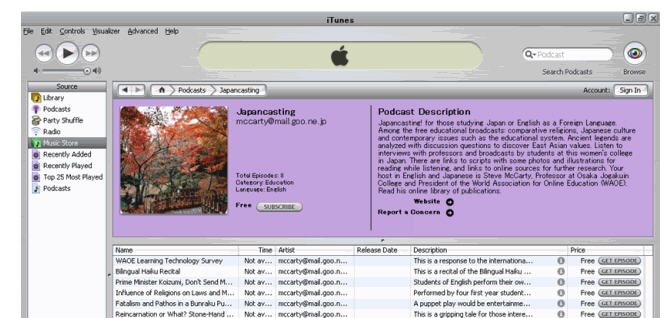
Probablement les premiers apports sur le Podcasting pour l'enseignement des langues:
Diem (2005). Podcasting: A new way to reach students. The Language Teacher, 29 (8), pp. 45-46.
McCarty, S. (2005). Cultural, disciplinary and temporal contexts of e-Learning and English as a Foreign Language. eLearn Magazine: Research Papers, April 2005. Retrieved August 5, 2005, http://elearnmag.acm.org/featured.cfm?aid=1070950
McCarty, S. (2005). Spoken Internet To Go: Popularization through Podcasting. JALT CALL, 1(2), 67-74. http://www.waoe.org/president/podcasting_article.html
While podcasting is considered a new technology, McCarty notes that Internet audio files, audio conferencing and video conferencing have been around for quite a while. Audio "represents a great leap in sensory input over text" (p. 67), and recent trends in technology, including easier-to-use recording technology, high-speed Internet connections and newer versions of software available for listening to audio files has helped podcasting to grow in popularity. McCarty sites a number of resources for teachers interested in podcasting, including web-hosting services that can host and help you produce podcasts. In addition, he provides an overview of how Osaka Jogakuin College in Japan, the first college in the word to give away iPods to incoming freshmen in 2004, has been encouraging the use of iPods into the classroom. For example, students majoring in English as a Foreign Language use the iPods to download news stories needed to complete homework assignments.
In addition to providing this overview, McCarty goes into specific detail when discussing a project called Japancasting, a podcast aimed at students in Japan learning English. Japancasting, currently in progress, will contain episodes with topics such as Japanese culture and religions, as well as the educational system and ancient legends. Most episodes will contain links to transcripts, and McCarty states that students, as well as professionals, are contributing scripts and interviews. The aim for Japancasting is not merely to move existing, textual content onto the Internet in a new format, but it instead aims to add another dimension to existing content.
Source: http://www.public.iastate.edu/~volkerh/projects/podcasting/01resear...
------------------------
Stanley, G. (2006). Podcasting: Audio on the Internet Comes of Age. TESL-EJ, 9(4).
This article discusses issues related to audio and video podcasting, as well as webcasting, that are of interest to language teachers thinking about integrating these new technologies into their classrooms. Stanley begins with a brief overview of what podcasting is and how podcasts work, and then discusses possibilities for using podcasts in the language classroom, including as a supplement to textbook materials, as a source for authentic listening materials, and as a way for students to gain information on specific aspects of the language, such as idiomatic expressions or grammatical constructions. Stanley recommends many places to search for podcasts, including Podcast Alley, Podcast Pickle, Englishcaster, or the Internet TESL Journal's links.
One other approach to using podcasts in the classroom is to have your students produce their own podcast or podcast episode. Stanley suggests starting “a podcast exchange project with another class and students from other parts of the world” (p. 4). To help teachers gain the knowledge needed to do this type of project, he outlines two ways to create podcasts: an easy way, using an automatic podcast creation tool (such as Odeo or Podomatic , or a more advanced way using Audacity to record your mp3 file, server space to house the file (he cites the free space provided by Ourmedia, where you will need to register with the Internet Archive beforehand as a possibility), and a blog from which to link the file. Once you’ve decided to involve your students in the podcasting process, Stanley suggests that your students may be motivated by the prospect of a real audience, and recommends that teachers listen to any of Bob Sprankle's Room 208 podcast episodes to see how this has been done before. Stanley also discusses his experience of including students in the production of a podcast, and claims “[t]he attention to detail and interest is superior to when learners are producing work which is only being seen by an audience of one (the teacher). Questionnaires given to the students after the course also showed they appreciated the value of the publishing project” (p. 6).
Finally, Stanley discusses video podcasts and webcasts, live, video or audio broadcasts, and suggests using these to encourage interaction between students around the world. Stanley admits that “[l]ive interactive webcasting may be difficult to set up on your own, but a new venture through a site called EFLBridges makes it easier to involve your students in live voice and chat webcasts. Using the free Internet telephony software Skype, students can call in and chat to other students from around the world” (p. 6). While Stanley admits that new uses of these technologies for language learning have yet to be discovered, the possibilities are exciting.
Source: http://www.public.iastate.edu/~volkerh/projects/podcasting/01resear...
-------------------------------
McQuillan, J. (2006) IPod in education: The potential for language acquisition. White Paper. En ligne:
http://images.apple.com/ca/education/docs/leaders/Apple-iPodLangAcq...
Delivering Comprehensible Language with iPod
The iPod makes it possible to deliver large quantities of comprehensible language to
students in an efficient and convenient manner. One feature especially appealing to
language teachers is the ability to give students contextual support with the help of
the iPod screen, especially at the lower levels of proficiency.
Taking Advantage of the “Acquisition-Friendly” Features of the iPod
Given the parameters set out above for effective language teaching, we can now turn to how specific features of the iPod, iTunes, and iLife software can enhance instruction.
Audio-Only Input
The iPod is, above all else, a portable media player designed to deliver audio and video
content to users. As such, it can be used in instruction to provide students with literally
hundreds of hours of audio-only comprehensible language input on both conversational
and academic topics.
Audio Recording
iPod players come equipped with a high-quality audio recording capacity.With an addon
microphone, they can be used to record audio that can then be used for instruction
or assessment. The possible applications of this function are numerous. For teachers, it is
possible to record additional audio input, classroom presentations, narrated stories, and
other instructional material. Students can record themselves and classmates for a
classroom assignment and provide speech samples to the teacher for assessment.
Students can also use the iPod to interview native speakers for use with another
successful teaching strategy, “narrow listening.” Narrow listening involves listening to
several audio recordings on the same or a similar topic, recorded by different speakers of
the target language.
-
 Commentaire de Monica le 8 décembre 2010 à 13:49
Commentaire de Monica le 8 décembre 2010 à 13:49 -
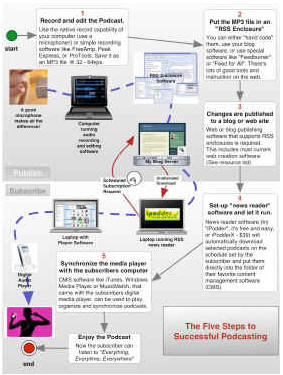
L'article de Meng, P. (2005) Podcasting & Vodcasting: a white paper, Definitions, discussions & implications. University of Missouri IAT services, n'est plus disponible; mais je viens de trouver
un site web qui résume ses apports:
Podcasting And Vodcasting In Higher Education: How Disruptive Will They Be?
http://www.masternewmedia.org/news/2005/04/16/podcasting_and_vodcas...
Here are the key highlights of the paper relating to both potential educational applications and possible associated issues and implications:
Applications:
Recordings of lectures for those students unable to attend the lecture in person.
Audio recordings of textbook text, made available for students by the chapter, would allow students to "read" or review texts while walking or driving to class. It could also be a significant aid to auditory learners.
Students could record and post project audio and video interviews which could be automatically downloaded to an instructors laptop or MP3 player for review.
The same could be done for language lessons where students forward audio of their pronunciation dialogues. They could even swap these with peers for peer review before turning in the final form to the instructor.
Oral reports recorded and archived.
Musical resumes. Music critique.
Libraries of bird sounds that the budding ornithologist could receive via seasonal subscription and take with them to the field.
Downloadable library of high resolution heart sounds for medical students.
Issues and Implications:
How does podcasting or vodcasting challenge the current "talking head" model of classroom lectures ? If all lectures are available via video and audio, do students need to go to class? How often? Why? How can they be kept in class?
Who owns the content, the school, the instructor, the user? Can this content be used outside of the university community? How is it protected or secured to the owner or subscriber?
Who's going to edit the content? What are the guidelines for editing? What's real - what's not?
How is copyrighted material tracked and/or verified?
Can money be made from this?
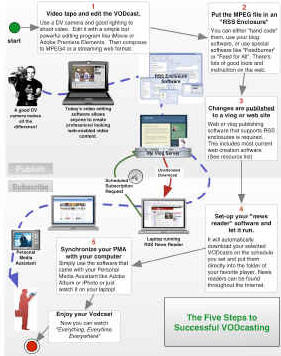
----------------------
Et je vous passe aussi quelques posts d'un blog pour l'enseignement de l'anglais,
qui pourraient être actuels et nous donner des idées pour nos pratiques en classe.
English As A Second Language (ESL) Podcast Resources for Studying English
http://esl-advices.blogspot.com/2006/08/english-as-second-language-esl-podcast.html
- EslPod.com site. This site and its podcasts are created by the Center for Educational Development, in Los Angeles, California. Dr. Lucy Tse writes scripts and records many of the dialogs and stories. Dr. Jeff McQuillan is the host of the podcasts. Both were university professors of applied linguistics and education for many years, and have taught English as a Second Language at several colleges and universities.
An dialog or story read a bit slower than normal speech.
An explanation of some of the expressions and phrases used in Part 1.
A repetition of the dialog or story at a native rate of speech.
- TOEFL Podcast by the Center for Educational Development and Dr. Jeff McQuillan. This podcast has a similiar structure to ESL podcast:
A dialog or conversation at a somewhat slower speed
An explanation of some of the expressions and phrases used in Part 1
A repetition of the dialog or conversation at native speed
A comprehension question similar to those found on the exams
- English Idioms and Slang podcast, which is set of really short issues about english idioms.
- English Teacher John Show Podcast. Teacher John uses many different studying techniques such as: listening to english speakers dialogs and describing new idioms and new words, listening and describing songs, speaking about world news, etc.
How to use podcasts and other audio records effectively
http://esl-advices.blogspot.com/2006/08/how-to-use-podcasts-and-other-audio.html
Educational Podcasts of Universities: MIT and Harvard
http://esl-advices.blogspot.com/2006/08/educational-podcasts-of-universities.html
Berkeley lectures as podcasts
http://esl-advices.blogspot.com/2006/08/berkeley-lectures-as-podcasts.html
Using Voice Of America Podcasts to Improve Listening and Speaking Ability
http://esl-advices.blogspot.com/2006/08/using-voice-of-america-podcasts-to.html
"Narrow Listening" - Effective Method of Listening Comprehension Improvoment
http://esl-advices.blogspot.com/2006/08/narrow-listening-effective-method-of.html
-
 Commentaire de Aisha le 7 décembre 2010 à 20:28
Commentaire de Aisha le 7 décembre 2010 à 20:28 -

Pour compléter votre rubrique BIBLIOGRAPHIE
http://flenet.rediris.es/blog/actiblog2.html#biblioPodcasting
Stéphanie Roussel, Angelika Rieussec, Jean-Luc Nespoulous et André Tricot, « Des baladeurs MP3 en classe d'allemand - L'effet de l'autorégulation matérielle de l'écoute sur la compréhension auditive en langue seconde », Alsic, Vol. 11, n° 2 | 2008, [En ligne], mis en ligne le 30 mars 2008. URL : http://alsic.revues.org/index413.html. Consulté le 07 décembre 2010.
Résumé:
Nous rendons compte de plusieurs expérimentations au cours desquelles des élèves français de secondes LV1 allemand ont écouté plusieurs documents sonores en allemand au format MP3 sur ordinateur. Pendant leur écoute, leur écran a été filmé. Les mouvements de la souris et donc précisément les codes temporels (time codes) des pauses, des retours en arrière et des avances rapides effectués pendant l'écoute ont ainsi été enregistrés, puis analysés. Cette méthode nous a permis de rendre compte des stratégies cognitives d'écoute autorégulée. Les données sont analysées d'un point de vue linguistique et psycholinguistique. Nous avons pu dégager quatre grands types d'écoute. Il en ressort que les auditeurs plus compétents ont une approche plus globale de la tâche d'écoute et que les moins compétents s'arrêtent plus souvent et ont plus de difficultés à comprendre le message. Notre étude montre que la possibilité d'exercer un contrôle sur l'input sonore améliore en règle générale la performance en compréhension. Cette performance dépend elle-même de la stratégie d'écoute utilisée et du niveau initial des auditeurs.
--------------------
Lord, G. (2008) Podcasting communities and second language pronunciation. Foreign Language Annals, 41(2), 364-379.
http://onlinelibrary.wiley.com/doi/10.1111/j.1944-9720.2008.tb03297...
Abstract:
Although often neglected in language classrooms, second language phonology
is a crucial element in language learning because it is often the most salient
feature in the speech of aforeignel: As instructors, we must decide how to emphasize
pronunciation and what techniques to use. This article discusses a collaborative podcasting
project in an undergraduate Spanish phonetics class. Students worked in small
groups to create and maintain their own podcast channel on which they uploaded
recordings for group member feedback. Each recording focused on particular aspects
of Spanish pronunciation, using tongue twisters, short readings, and personal refection
on students’ own pronunciation. Both attitudes and pronunciation abilities were
assessed before and after the project, and both werefound to improve. The benefits of
podcasting projects to improve language skills are discussed from an empirical as well
as a pedagogical perspective.
---------------
Ducate, L., & Lomicka, L. (2009) Podcasting: An Effective Tool for Honing Language Students’ Pronunciation? Language Learning & Technology, 13(3): 66-86. En ligne: http://llt.msu.edu/vol13num3/ducatelomicka.pdf
Abstract:
This paper reports on an investigation of podcasting as a tool for honing pronunciation skills in intermediate language learning. We examined the effects of using podcasts to improve pronunciation in second language learning and how students’ attitudes changed toward pronunciation over the semester. A total of 22 students in intermediate German and French courses made five scripted pronunciation recordings throughout the semester. After the pronunciation recordings, students
produced three extemporaneous podcasts. Students also completed a pre- and post-survey based on Elliott’s (1995) Pronunciation Attitude Inventory to assess their perspectives regarding pronunciation. Students’ pronunciation, extemporaneous recordings, and surveys were analyzed to explore changes over the semester. Data analysis revealed that students’ pronunciation did not significantly improve in regard to accentedness or comprehensibility, perhaps because the16-week long treatment was too short to foster significant improvement and there was no in-class pronunciation practice. The podcast project, however, was perceived positively by students, and they appreciated the feedback given for each scripted recording and enjoyed opportunities for creativity during extemporaneous podcasts. Future studies might seek to delineate more specific guidelines or examine how teacher involvement might be adapted to the use of podcasts as a companion to classroom instruction.
More specific to language learning, podcasting has several theoretical underpinnings in second language acquisition (SLA) research. Swain and Lapkin (1995) recognize output as essential for second language learning. One strategy they suggest is having students listen to themselves as they edit their output, and then go back, listen again, and revise as necessary. They can also receive feedback from other students and their instructor. This type of approach could be quite useful in podcasting as it is easy to record, re-record and listen to various segments of a podcast. After students record podcasts, they can listen multiple times, edit their podcasts and comment on their classmates’ recordings (see also Lord, 2008; Meng, 2005).
However educators decide to use podcasts, it is first important to determine instructional goals (O’Bryan & Hegelheimer, 2007) and keep the emphasis on pedagogy (Rosell-Aguilar, 2007, 2009). In keeping these objectives in mind, practice with pronunciation, listening, and speaking are specific ways that foreign language teachers and learners can tap into this technological tool. Using podcasting in contextualized language learning (as opposed to simple pronunciation drills)
can also be useful in that it allows teachers to contextualize pronunciation and create meaningful tasks, rather than simply have students repeat and practice lists of words or sounds. Chan and Lee (2005) note “audio has been vastly neglected and underused as a teaching and learning medium in recent years” (p. 62).
McQuillan (2006b) highlights several tasks that focus on oral production, such as using audio diaries, conducting interviews with native speakers, and hosting talk shows where students “can record themselves and classmates for a classroom assignment and provide speech samples to the teacher for assessment” (p. 6). Tavales and Skevoulis (2006) suggest that students can record themselves or native speakers and then engage in listening practice as they focus on pronunciation, grammar use or intonation.
-
 Commentaire de Zhying le 6 décembre 2010 à 19:40
Commentaire de Zhying le 6 décembre 2010 à 19:40 -
Bonjour Ashley,
Excellente idée de nous faire découvrir l'univers de la Baladodiffusion pour l' Apprentissage Langues.
Je te propose aussi les liens suivants, avec des podcasts et des transcriptions:
Free French Listening Resources Podcast - Jennifer Wagner • ielanguages
http://www.ielanguages.com/frenchlistening.html
http://www.ielanguages.com/podcast/
Listen to French http://www.listentofrench.org/
LangMedia French
http://langmedia.fivecolleges.edu/collection/lm_france/fr_index.html

GABFLE - Blog pour apprendre le français avec des interviews de personnes francophones...
http://gabfle.blogspot.com/
DOCUMENTS AUDIO B2 (intermédiaire +) : (16)
Interview Adeline : (1)
Interview Caroline : (1)
Interview Christelle : (1)
Le cadre de vie :
Delphine présente la ville de Lyon (A2)
Aurélie parle du Vélib parisien (B1)
Florence parle de sa vie à Moscou (B1)
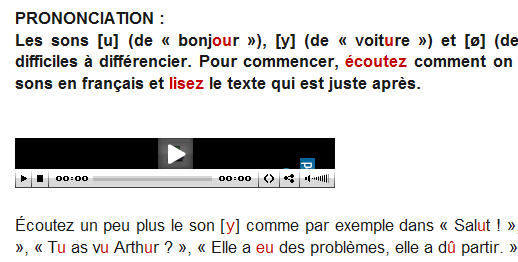
- ‹ Précédent
- 1
- 2
- 3
- 4
- Suivant ›
© 2015 Créé par Campus FLE.

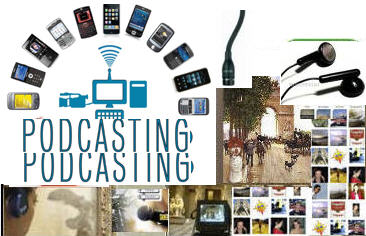

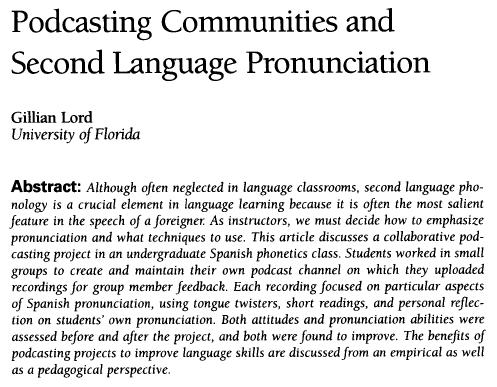


















Vous devez être membre de Campus FLE Education pour ajouter des commentaires !
Rejoindre Campus FLE Education